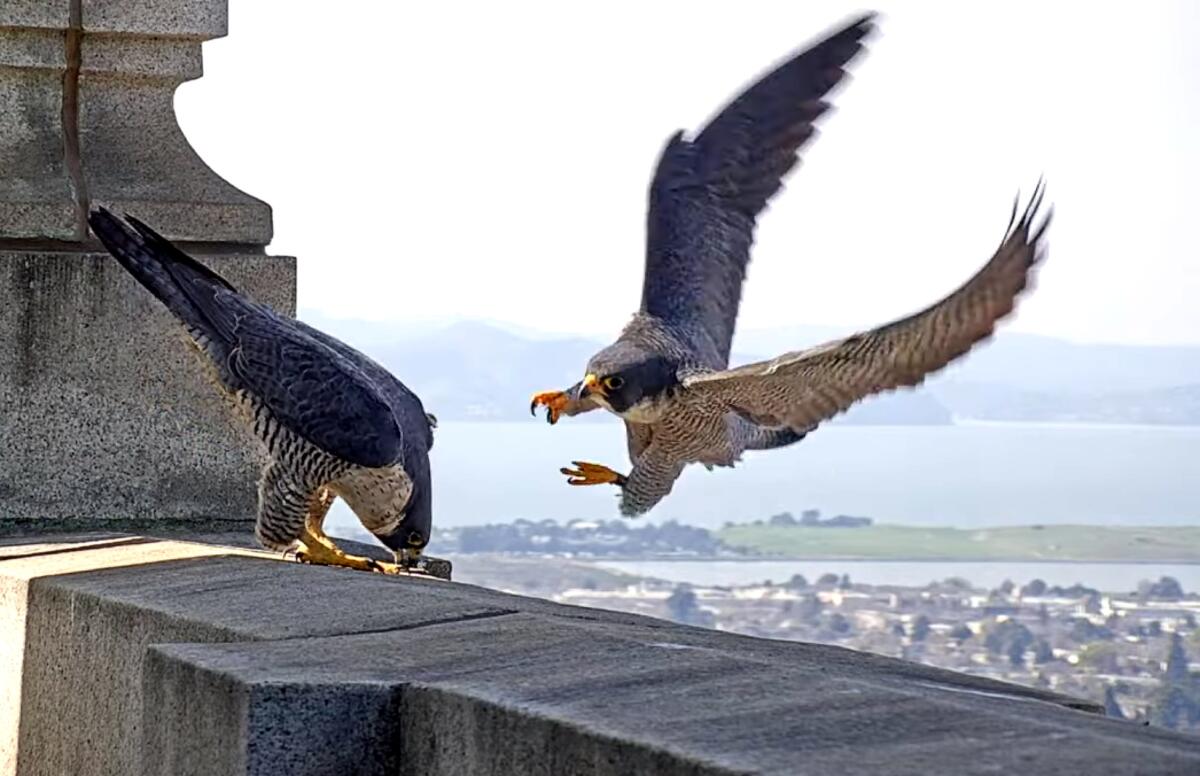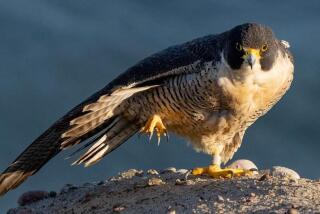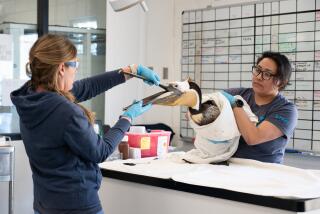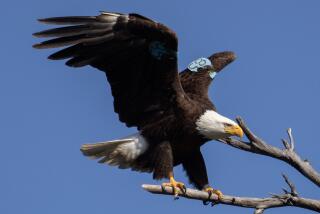Berkeley has bird’s-eye view of peregrine falcons’ love triangle

A scandal is unfolding at UC Berkeley, and at its center are the flirtations of an interloper and a wounded mate.
Grinnell and Annie have made their home atop the Campanile, a 307-foot bell and clock tower overlooking the university’s campus, since at least 2016. The peregrine falcons are resourceful, territorial birds, and they generally mate for life.
But last month, 8-year-old Grinnell was found badly wounded at a tennis club about two miles from his nest.
A good Samaritan captured the bird Oct. 28 and took him to Lindsay Wildlife Rehabilitation Hospital in Walnut Creek, where doctors found he’d had quite a beatdown. He was missing a large patch of feathers on his chin and throat. One of the raptor’s wings was injured, and the tip of his upper beak was broken off.
The good news is, Grinnell is expected to make a full recovery. But try telling that to Annie.
The female falcon, who is estimated by researchers to be at least 7, seems to be taking up with another male suitor while Grinnell is in the hospital, much to the dismay of the local bird community, which has watched the pair’s relationship blossom over the years.
What’s worse, researchers say it’s likely Annie’s new beau is one of two birds that attacked Grinnell.
The love triangle has been unfolding on nest cams that researchers installed in 2019, and like any good reality TV show, everyone has an opinion.
“No, Annie!!” one commenter on Facebook wrote. “Grinnell is still alive! Don’t fall for this new fellow!!”
Another Grinnell fan wrote, “I wish my heart wasn’t broken by this, but alas, I am weak to survival of the fittest.”
Sean Peterson, a UC Berkeley doctoral candidate who studies wetland birds, and his wife, Lynn Schofield, run the CalFalcons nest cams and social media page dedicated to the falcons. He said that once it became clear that Grinnell was out of imminent danger, people decided they didn’t like the new guy trying to swoop in.
“On a personal level, if Grinnell was able to recover and able to return to his territory, I would be happy,” said Schofield, who works with the nonprofit Institute for Bird Populations. “But as a biologist, I want what is best for the species.”
Monitoring the falcons — let alone their love lives — was just a foggy daydream a few decades ago, Peterson said.
The species was on the brink of extinction because of harmful pesticides and dwindled to only two breeding pairs in the continental U.S. by the 1970s. A breeding program led by falconers with captive birds helped the species bounce back.
Researchers in Berkeley first met Grinnell in 2013 as a nestling, and Annie appeared a few years later. Their personalities have developed over the years, and those who study the pair have learned quite a bit about the birds. For example, Grinnell sits with his mate’s eggs longer than most male falcons.
“He’s a really good dad,” Peterson said when reached by phone.
“Annie is territorial and especially big for a female falcon,” Schofield said on the phone call. “Her personality tends to be a bit more dominant.”
“She’s aggressive,” Peterson piped in. “Whenever we’re on the nest level, she’s always trying to swoop at us.”
Grinnell underwent minor surgery to close a wound on his wing and is on antibiotics and other medications. Peter Flowers, the manager of Lindsay Wildlife Rehabilitation Hospital, said the beat-up bird is recovering well but could be off his feet for another month.
“We have to take it day by day,” Flowers said.
Meantime, there’s this new younger guy who is settling into Annie’s nest. There’s another female in the mix too, but Peterson said Annie seems awfully receptive to the new man in her life.
Still, there’s hope — and time — for Grinnell and Annie to reunite, Schofield said. Falcons usually don’t settle on a mate until February, and Grinnell could return, fight for his territory and push the new male out of the nest. Or he could simply move on and find a new mate.
The breakup would certainly leave a sting among the pair’s admirers.
“Fans love these birds like family, but they’re distraught that the family might be breaking up,” Peterson said. “This is what happens with nature.”
More to Read
Sign up for Essential California
The most important California stories and recommendations in your inbox every morning.
You may occasionally receive promotional content from the Los Angeles Times.











